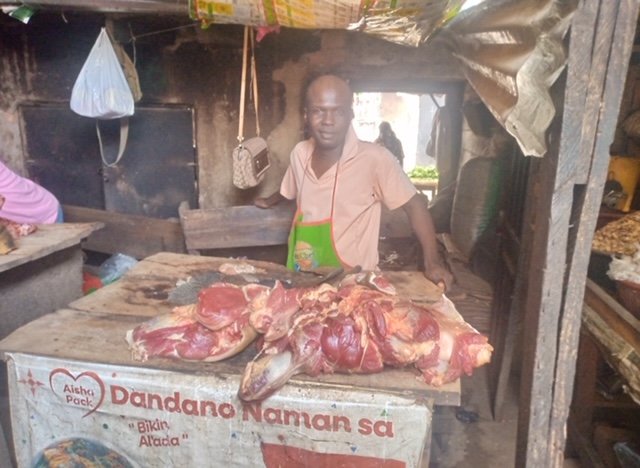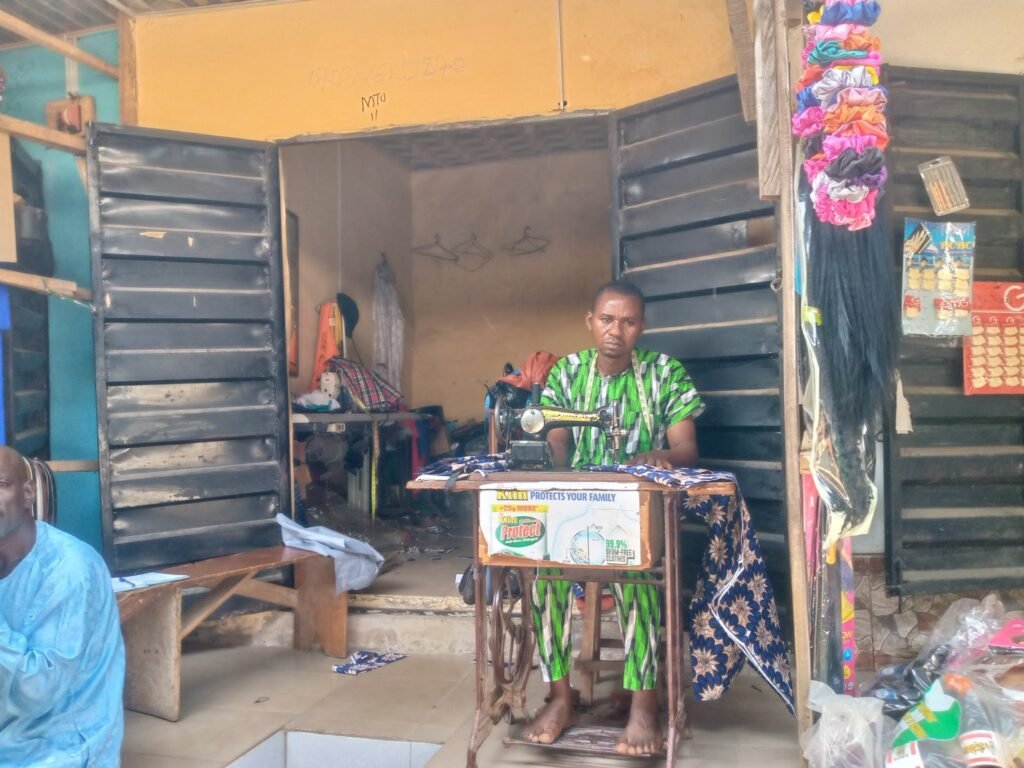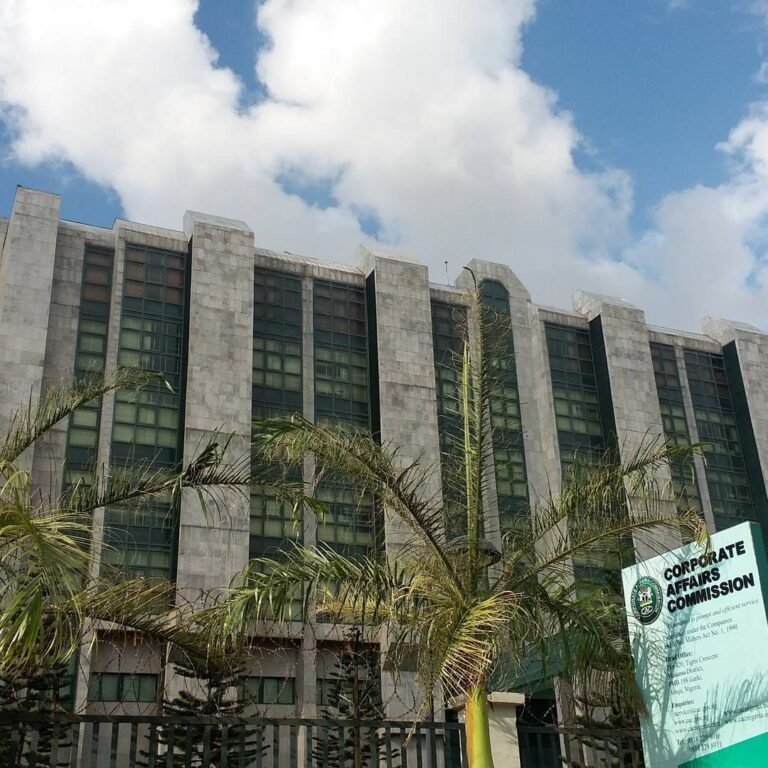It was a bustling Monday morning at the Wurukum Market in Makurdi, Benue State, when Nguhemen Iorhuna, a middle-aged supplier of beans and rice, meticulously arranged her goods, hoping for a profitable day. Around 10 a.m. on the 8th of October, just as the market began to fill with customers, a white Hilux van screeched to a halt.
At first glance, a couple of young men who alighted from the vehicle seemed like potential customers. But their demeanor told a different story; they were tax officers from the Makurdi Local Government Area of the State. Without explanation, they began seizing goods. “We tried pleading with them,” Nguhemen recalls. “But it was like talking to a wall. They packed our goods into the van and drove off.”

Nguhemen wasn’t alone in her ordeal. Traders watched helplessly as bags of rice, beans, sugar, and other items were loaded into the vehicle. The officers justified their actions by citing the traders’ failure to respond to an invitation sent to them two days earlier over tax payments.
Later that day, under the leadership of their women’s leader, Nancy Nyiter, the market women rallied to recover their goods. Contributions were pooled, totaling ₦50,000, which they handed over to the officials as a “recovery fee.” When the seized items were returned, however, they came back incomplete.
“A 25kg bag of rice was missing,” Nguhemen recounts. “Sugar worth ₦5,000 and four bottles of red oil belonging to another trader, Dina Gerger, were also gone.” When Nancy approached the tax officers to demand an explanation, their response was as callous as their earlier actions.
“They told us to tax ourselves and pay Nguhemen for her loss,” Nancy said. The traders, fearful of further retaliation from officials, complied, contributed money to compensate Mrs Iorhuna. “What choice did we have?” Nancy added. “These people are government officials. If we fight them, they’d make things worse for us.”

For the traders, this was just another chapter in a long history of exploitation. Despite paying multiple levies—ranging from environmental fees to waste management charges—the market remains in shambles. Piles of uncollected waste fester under the sun, toilets are unusable, and basic infrastructure is non-existent. This leaves marketers to wonder what the regular payments of different taxes and levies are used for.
Services That Don’t Exist
For Abdullahi Loko, a meat seller at Wurukum Market in Makurdi, the cost of doing business goes far beyond the price of livestock. Each year, he pays taxes exceeding ₦50,000—fees that supposedly cover basic amenities like electricity and water. “Yet, there is no light and no water, ” explained Abdullahi. “I have lost so much meat because we can’t refrigerate anything in this market.”
Without electricity, Abdullahi faces frequent losses as his unsold meat spoils under the relentless heat. Despite the steady flow of taxes collected by local authorities, traders like him see no tangible benefits in return. “It’s as though we’re throwing our money into a black hole,” Abdullahi said, gesturing towards his stall, where chunks of meat hung precariously in the midday sun.

Abdullahi called on the Benue state government to fulfill its responsibilities to the taxpayers, emphasising that their demands are not unreasonable. “We’re not asking for free services,” he said firmly. “We pay for electricity and water as part of the tax, and it should be reflected. The government needs to live up to our expectations and provide what we’re paying for.”
His frustration reflects the sentiment of many traders in the market, who feel trapped in a system that takes from them without giving back. For Abdullahi, the solution is simple: accountability. “If they collect our money, they should use it to fix the market’s problems. That’s all we’re asking for.”
Tailors Struggle
For Akawe Isaac, the chairman of the Makurdi Tailors Association, the taxes he pays each year have become a frustrating reminder of unfulfilled promises. Having lived and worked in Wurukum Market for over ten years, Isaac says he pays up to ₦40,000 annually, covering levies for electricity, environmental management, water, and infrastructure. Yet, these essential services remain absent.
“Every time I need electricity, I have to walk a long distance to neighboring houses to iron clothes or use a sewing machine,” Isaac lamented. The lack of electricity in the market has also rendered his industrial sewing machine unusable—a key tool for producing high-quality work.

“The industrial sewing machine adds a certain beauty to clothes,” he explained. “But without electricity, I can’t use it. Customers notice and often leave, making excuses. Once they leave, they never come back.”
Isaac’s frustration is justified by his struggles and that of many traders in Wurukum Market, who are only asking the government to give them services they forced them to pay for.
The Hidden Costs of Doing Business in Benue State
The lack of water and electricity creates a barrier for Favour Aka-Amaka, a Wurukum-based trader, from running a profitable business in the market. She used to sell cold beverages “but the process was too tedious,” she explained. Every day, she would need to transport those items to her home to refrigerate, costing what were supposed to be her profits.

Favour lamented her taxes and levies was supposed to cover the provision of toilet facilities, but the only ones in the market are privately managed. “Imagine paying taxes that cover toilet facilities, only to find there are none, and the ones available still cost you extra. Is that not economic sabotage?” She queried.
Anselem Eze, a beverage seller in Otukpo Main Market, Benue South-South, gave what he termed the correct answer. He believes paying taxes has become synonymous with theft and extortion. In October 2024, Anselem’s shop was burgled, and goods worth over ₦500,000 were stolen. “We pay ₦500 every month as a security levy to the Otukpo Local Government Authority,” said Eze. “But when my shop was burgled, I reported it to them. All they said was that they would investigate, but till today, nothing has happened.”
The reporter’s visit to Otukpo Main Market revealed waste littered around the front of Anselem’s shop. “We also pay environmental taxes, but as you can see, there’s no waste management system here. The local government has failed to provide bins or evacuate the waste,” he lamented.

Attempts to get comments from the Otukpo Local Government Authority were unsuccessful. A middle-aged man, who identified himself as Onoja and a staff member of the council, initially agreed to speak. However, when pressed about the issues surrounding market taxes, he hesitated. “I don’t think I can talk on that,” Onoja said, declining further comment.
Government Deflects Blame for Mismanagement
Felix Dav, the Tax Coordinator for Makurdi Local Government Area in Benue State, has attributed conflicts between traders and tax officials to the traders’ reluctance to fulfill their tax obligations. According to Dav, many traders resist paying taxes, which often leads to confrontations during collection.
“Most traders are not willing to pay taxes. Some who are paying do so grudgingly. You go out to collect taxes, and they will abuse you before paying the money,” Felix claimed.
However, the Secretary of the Benue Traders Union, Makurdi branch, Mr. Onuakpado Matthew, presented a different perspective. He emphasised the underlying issue is poor tax management by the government, which has eroded trust among the citizens. While the government accuses traders of resisting tax payments, Matthew contends that most genuine traders comply with their obligations.
“If there are people grudgingly paying taxes, it’s because they don’t see the benefits. Why should anyone be eager to pay when nothing comes out of it?” he questioned.
Having worked in the market since 1996, Mr. Matthew expressed frustration over decades of unfulfilled promises. “Every election year, politicians come to this market with all kinds of promises, and nothing ever materialises. We’re not asking for free services. We pay for them, and it’s the government’s duty to provide them,” he said.
“If you walk around this market, you’ll see many shops closed. That’s because people are paying taxes without any benefits in return. Taxes are eating into our investments. You pay the government to provide water, but when they fail, you still have to spend your profits to buy water yourself. How can businesses survive like this?

“We want to grow our businesses, not shut them down. The government must deliver on its promises and show that our taxes are not wasted,” he added.
The Chartered Institute of Taxation of Nigeria (CITN) also identifies trust deficits, lack of accountability, and the activities of non-state actors as key reasons Nigerians are reluctant to pay taxes.
Speaking during the commissioning of the newly constructed ‘David Olorunleke House,’ the CITN Abuja Liaison Office, in Abuja, the Institute’s President, Mr. Samuel Agbeluyi, emphasised the need for federal and state governments to utilise collected taxes transparently to rebuild public confidence.
“The billions paid by Nigerians as tax are not being felt by the citizens. This has eroded trust and contributed to non-compliance,” Agbeluyi stated, adding that the accountability gap undermines the willingness of Nigerians to fulfill their tax obligations.
He further explained that addressing this trust deficit requires deliberate efforts by governments at all levels. “We tell the government at federal and subnational levels: whatever you collect, please use it for the good of the people. By the time you do that, we build the confidence which has been eroded over the years.”
Agbeluyi also highlighted the benefits of voluntary compliance in taxation. “Once we build confidence, people will voluntarily comply. This reduces the cost of tax collection and generates more revenue for public expenditure. It is a journey that must be pursued for enduring progress because tax revenue is essential for a civilised environment.”
Market Reforms
In an interview with Isaac Akaager, Special Advisor to the Governor on Local Government Area Markets, he said the Benue State government has pledged to reform local markets to ensure better services for traders and improve revenue collection. He acknowledged the long-standing issues of poor infrastructure, such as the lack of water and electricity in markets, however, he said, the government is in the process of designing policies to ensure taxes collected from markets are reinvested to improve infrastructure and services.
“Our role is to complement the Benue Internal Revenue Service (BIRS) in tax collection while ensuring traders feel the benefits of paying taxes,” explained Akaager.
This report was produced as part of the Liberalist Centre’s Journalism for Liberty Fellowship project with funding support from Atlas Network.












